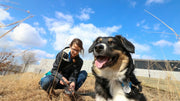Reducing Your Eco-Pawprint
“I have a distinct memory of saying to my family ‘one day David Suzuki and I will be like this’ and crossed my fingers. I was about nine years old,” says Lindsay Coulter, also known as the “Queen of Green” for the David Suzuki Foundation. “I didn’t understand his job exactly, but I knew he loved nature and that he was working to save the planet.
“Fast forward and here I am,” says Coulter. “I work on nature conservation campaigns and, as the Queen of Green, provide commentary on everyday green living and lifestyle topics. I really love my job…and my dog, Harper. He’s an SPCA special or, as I like to say, a Lab crossed with a truck.”
Given Lindsay’s perfect pedigree, we asked her to give us some pointers on how, as dog guardians, we can become more environmentally friendly. Here, she offers easy-to-implement changes that will not only reduce your eco-pawprint, but will also improve your—and your dog’s—health.
MD: Three things pet lovers can do to “green” our lives and homes?
Lindsay:
One: Detox your home. Our indoor air quality is sometimes five times as polluted as outdoor air quality. If you are using conventional cleaning products, you are exposing yourself and your family to a slew of cancer-causing chemicals. You can start reducing your exposure to toxic chemicals by making your own cheap and effective cleaners. Making your own laundry soap from a few simple ingredients of soap flakes, Borax, and washing soda will save you a ton of money and will only cost you a dollar a litre. And ditch the smelly dryer sheets! Get away from using synthetic fragrance. They can increase the incidence of asthma, irritate the skin, and many include chemicals that are known carcinogens, like the formaldehyde in many air fresheners. Petbiotics makes a great probiotic-powered all-purpose cleaner that is safe and all-natural. Check it out here.
Two: Go on a “plastic diet.” Choose dog toys out of natural materials like wool, natural rubber, organic cotton, or hemp. Or a simple sniff test will suffice if you’re checking out plastic toys. Those made from polyvinyl chloride (PVC) often stink and may have additives like lead, cadmium, or phthalates, a cheap plasticizer that disrupts hormones. Vinyl chloride is also a known human carcinogen. Modern Dog's office pups love the eco-friendly Knot Ball from Forever Mootsy, the Auburn Leathercrafters All-Natural tug toys made from natural cotton and vegetable tanned leather, and Otter\\\'s 100% natural hemp rope bone toy.
Three: Dooty Duty. No matter how big or small our dogs, most of us pick up dog doo about twice a day. I once reused my plastic shopping bags for this dirty job, but nowadays, it’s rare for one of those to make it into my home. Switch to biodegradable and compostable poop bags (Modern Dog loves bioDOGradable bags!). Better yet, the greenest option is to compost your dog poop, keeping it out of the landfill all together. For example, City of Vancouver dogs generate about 26,000 pounds of dog poop per year, most of which ends up in the landfill. Many resources exist online showing you how to build your own backyard composter—like City Farmer (cityfarmer.org/petwaste.html). Also check with your city or town to see how they prefer you dispose of it. Some recommend flushing.
MD: We all know that the consumption of meat has a hefty impact on the planet. Do you espouse a vegetarian diet for dogs?
Lindsay: Although I’ve been a vegetarian for 17 years, my dog is not. But whether kibble, raw, or other, it’s important to source your food as close to home as possible. It’s a great way to support your local economy and keep the food miles in check. And if you’re not sure where something is made or how they source their ingredients, don’t be afraid to ask. As consumers, we often forget that we are, in fact, voting with our dollar. If you’re unsure or you’d like your local grocer or pet store to supply something else, just ask. You’ll be pleasantly surprised!
MD: Number one thing dog guardians should do to reduce their environmental impact?
Lindsay: At the David Suzuki Foundation, we focus on four areas: how you get around (transportation), the food you eat, the energy you use, and the public action you take. The key would be to start with what you love; that way people tend to stick with a challenge and follow through. If you’re the athletic type or you want to save money fast, start taking transit to work or jump on a bike (Modern Dog staffers love biking with their dogs using the Bike Tow Leash attachment! Also, check out this helpful book for tips and tricks). Embracing Meatless Mondays is another option for the foodies or cooks in the family. Visit davidsuzuki.org to learn about more simple activities you as an individual can do that together make a huge impact!






